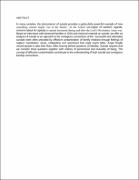| dc.contributor.author | Oboke, Henry | |
| dc.contributor.author | Whyte, Susan Reynolds | |
| dc.date.accessioned | 2019-09-12T09:44:41Z | |
| dc.date.available | 2019-09-12T09:44:41Z | |
| dc.date.issued | 2019 | |
| dc.identifier.citation | Henry Oboke & Susan Reynolds Whyte (2019) Anger and Bitter Hearts: The Spread of Suicide in Northern Ugandan Families, Ethnos, DOI: 10.1080/00141844.2019.1629982 | en_US |
| dc.identifier.uri | https://doi.org/10.1080/00141844.2019.1629982 | |
| dc.identifier.uri | https://hdl.handle.net/123456789/61 | |
| dc.description.abstract | In many societies, the phenomenon of suicide provides a particularly powerful example of how something sinister might ‘run in the family’. In the Acholi sub-region of northern Uganda, concerns about its capacity to spread increased during and after the Lord’s Resistance Army war. Based on interviews with bereaved families in 2016 and historical material on suicide, we offer an analysis of suicide as an approach to the contagious connections of kin. Successful and attempted suicides were often preceded by affective contamination of family relations through feelings of neglect, humiliation, abuse, indignation and resentment that made hearts bitter. Anger finally moved people to take their lives, often leaving behind questions of liability. Suicide requires that we consider these questions together with notions of personhood and mutuality of being. The concept of affective contamination contributes to the understanding of both suicide and contagious kinship connections. | en_US |
| dc.language.iso | en | en_US |
| dc.publisher | Journal of Anthropology | en_US |
| dc.subject | Acholi | en_US |
| dc.subject | Suicide | en_US |
| dc.subject | Kinship | en_US |
| dc.subject | Contagion | en_US |
| dc.subject | Affect | en_US |
| dc.title | Anger and Bitter Hearts: The Spread of Suicide in Northern Ugandan Families | en_US |
| dc.type | Article | en_US |

